SEO
10 Best Digital Marketing Facebook Groups
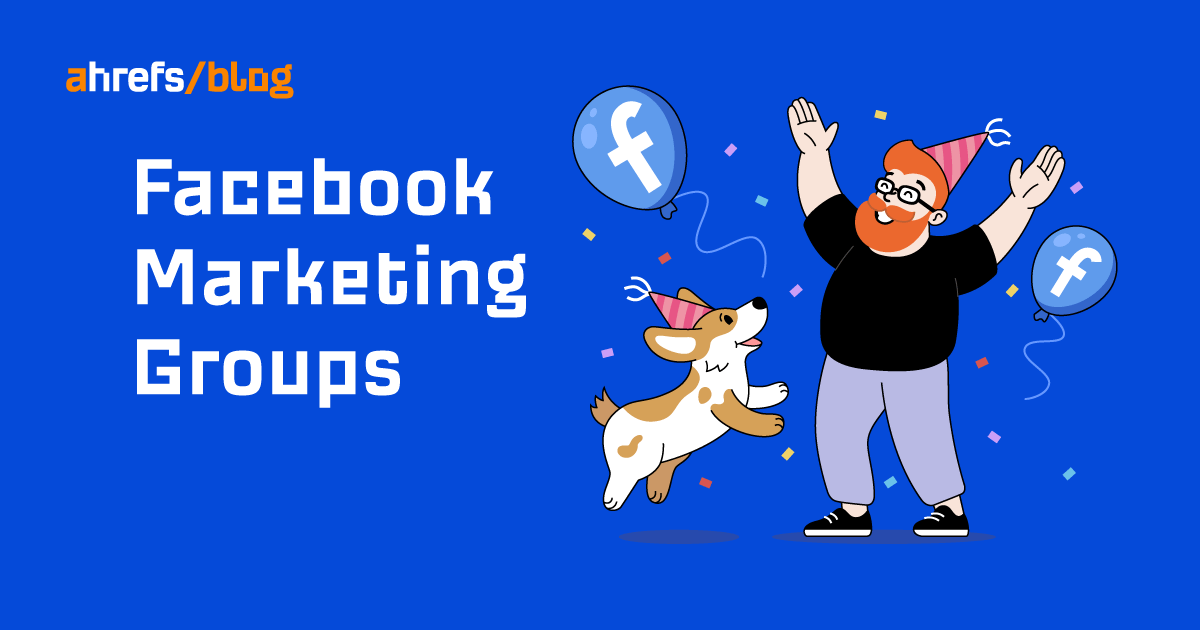
What makes a good Facebook marketing group?
To find out, I vetted over 35 of them based on the volume of activity in the group, the quality and relevance of the content, and how the admins and members engaged with each other.
Before getting into the list, do remember that many marketing groups require you to answer some simple questions before your request is approved, such as what you hope to get from joining the community.
Here are the 10 best Facebook marketing groups that made the list:
- Marketing Solved
- SaaS Growth Hacks
- CXL — Conversion Optimization, Analytics & Growth
- SaaS Products & Marketing
- Facebook Ad Hacks
- Sisters in SEO
- Google SEM Mastermind
- Dumb SEO Questions
- Local SEO Strategies & Google My Business Help with Tim Kahlert
- Superstar SEO
Founder: Kat Sullivan
Group type: Private
Topics covered: General marketing, social media
Ideal for: Beginners to experienced marketers, founders
Member count: 23.6K
Sign-up link: Facebook
Are you in the social media space? Here’s a community for you to expand your network, grow your social media presence, and learn from some knowledgeable folks.
Founder Kat Sullivan noticed that few Facebook group founders actively engaged with members and sought to fill the gap through Marketing Solved. Its main point of difference is its focus on connecting small-business owners and marketers with useful resources.
From my observations, Kat is generous in sharing her experiences of working with entrepreneurs and brands. She’s also been featured in publications, including Inc., Entrepreneur, and Fast Company—and is the co-founder of social media management tool Tassi.

In turn, members share a myriad of content, such as interesting marketing case studies, invitations to free marketing courses, and questions on entrepreneurship and monetizing online brands.

As with most marketing groups I came across, self-promotions aren’t allowed unless they are on specific threads. These include Instagram Mondays and Pitch & Promote Your Biz (the latter happens at least once a month).
Founder: Aaron Krall
Group type: Private
Topics covered: Entrepreneurship, general marketing, conversion rate optimization (CRO), growth hacking
Ideal for: Mid-level to experienced marketers, founders
Member count: 27.4K
Sign-up link: Facebook
Just like Kat’s Marketing Solved, SaaS Growth Hacks was conceived when founder Aaron Krall noticed the lack of a quality community for SaaS founders.
As a SaaS conversion specialist, he’s helped convert expired trial users into paying customers through email nurture campaigns. Today, the Facebook group is an extension of Aaron’s experiences and includes the founders of established tech companies such as Intercom and AdEspresso.
From what I’ve gleaned, its members are happy to share insights on how to start or scale a SaaS business, as well as improve or build better products.

Other topics of discussion include growth strategies for email marketing and product launches. Considering this, the group is probably better suited to more experienced marketers.
Founder: Peep Laja
Group type: Private
Topics covered: Marketing, CRO, growth hacking
Ideal for: Mid-level to experienced marketers
Member count: 15.1K
Sign-up link: Facebook
Peep Laja is a big believer in evidence-based marketing, and he built growth platform ConversionXL (CXL) on this very premise. His Facebook community is just the same: Members are candid in sharing about their failed experiments and frequently run polls or seek advice on analytics, growth, tag managers, and more.
The bulk of discussions revolve around Google Analytics, CRO audits, Google Search Console, as well as recommended marketing reads. You may also stumble upon posts like this one:

Given the depth of the conversations, you’re bound to learn something new from the sizable community of CRO-focused marketers. Peep also enforces a no-spam, no-link-dumping rule—something I reckon all of us will appreciate.
Founder: Tomer Aharon
Group type: Private
Topics covered: Marketing, entrepreneurship, social media
Ideal for: Beginners to experienced marketers
Member count: 15.8K
Sign-up link: Facebook
Run by Tomer Aharon—co-founder of software development platform Premio and SaaS product Poptin—this group helps SaaS founders and digital marketers of all levels share knowledge, ideas, and growth hacks.
I’ve found the community to be a helpful one. There are discussions on lead generation methods for SaaS startups, sharings on B2B marketing outreach tactics, as well as brainstorming threads on marketing outreach.

While promotional posts are allowed, these must be strictly SaaS-related. You’ll also find freelance and full-time job postings for marketing roles on occasion.
Founder: Catherine Howell
Group type: Private
Topics covered: Marketing, Facebook ads
Ideal for: Mid-level and experienced marketers, agency owners
Member count: 148.8K
Sign-up link: Facebook
This group is ideal for anyone who’s interested in discussing marketing best practices, social media ad campaigns, and management of client relationships (for agencies). While there are many insightful discussions, these can get fairly technical. Thus, having prior marketing knowledge is probably useful.

Founder Catherine Howell, who also helms social media agency Eight Loop Social and has been featured in the likes of Entrepreneur and Inc., is just as active in the community as the members.
For instance, she regularly poses questions or relatable memes.

If there’s one drawback of Facebook Ad Hacks, it’s the high volume of activity in the group. There are about 28 posts daily, which means questions tend to get washed down or go unanswered. I ultimately opted to turn off notifications for the group and visit it on occasion when I’m in need of advice or inspiration.
Founders: Kari DePhillips, Samantha Pennington
Group type: Private
Topics: Marketing, entrepreneurship, SEO
Ideal for: Beginners to experienced marketers, SEOs
Member count: 10K
Sign-up link: Facebook
Sisters in SEO began in 2018 to support women, minorities, and gender-diverse folks in the tech space.
Its founding story is interesting too: After attending an SEO course by The Content Factory, Samantha Pennington reached out to agency owner Kari DePhillips. The pair soon found common ground in wanting a safe place to share SEO knowledge—and so set up the Facebook group.
Today, the community remains an inclusive and safe space for members to discuss general and technical SEO, career advice or job openings, and recommended SEO tools.

The camaraderie is apparent and reminiscent of Women in Tech SEO’s. I also like that there’s plenty of support and encouragement from members, as well as occasional SEO jokes.

Founder: Schieler Mew
Group type: Private
Topics: SEM, local SEO, Google Ads
Ideal for: Mid-level to experienced marketers, SEOs, Google Ads specialists
Member count: 56K
Sign-up link: Facebook
This marketing group is a little more niche, with a myriad of questions on redirects, Google Search Console, improving low click-through rates, and more. And there’s plenty to learn, with active engagement of up to 20 quality posts a day.
Founder Schieler Mew is a passionate SEO himself and has the experience to speak for it. After working as an affiliate marketer for tech majors Uber and Lyft, he turned his focus to local SEO to help small businesses thrive.
Today, he’s the co-founder of ServiceLifter.com, a marketing agency that helps home-service companies grow their online presence.
Schieler’s focus on sharing knowledge with Google SEM Mastermind members is clear. Apart from anecdotes and interesting findings, he runs educational polls to help marketers find further growth. There are also moderators who share interesting takeaways with the growing community.

Founder: Jim Munro
Group type: Open
Topics: SEO
Ideal for: Beginners to experienced marketers, SEOs
Member count: 15.2K
Sign-up link: Facebook
With a name like Dumb SEO Questions, joining this group quashes any potential embarrassment about asking, well, dumb SEO questions. After all, this encourages more open discussions among members.
Expect healthy activity of up to seven posts daily, with discussions centering on technical SEO, Google Analytics, and Google Search Console.

Given how open the community is to marketers of all levels, it’s an excellent space to pick up tips from experts while asking “green” questions without fear of being judged. It’s also nice that the page has a strict policy against self-promotions, ensuring that learnings and discussions are streamlined for members.
Founder Jim Munro maintains an active presence in the group too.
Every month, he compiles questions from the group and takes them to SEO experts like David Rosam and Tim Capper via a livestream session on his YouTube channel. The channel is currently on its 426th episode—that’s some real dedication.
Founder: Tim Kahlert
Group type: Private
Topics covered: SEO, entrepreneurship
Ideal for: Entrepreneurs, founders, business owners
Member count: 36.2K
Sign-up link: Facebook
Ready to learn some solid, local SEO strategies? This group may be a good starting point. As an SEO himself, founder Tim Kahlert faced multiple roadblocks when he got banned from several marketing groups for being overly helpful in responding to members’ questions.
In response, he built the Local SEO Strategies community to further his knowledge-sharing, as well as help businesses drive leads and conversions through local marketing strategies.
The community seems better suited to business owners and entrepreneurs who need basic SEO advice, although there are quite a few marketers who weigh in on discussions too. From what I’ve gathered, many questions are to do with Google My Business profiles, local area pages, ranking better in Google Maps, and SEO.

To ensure the shared content is kept fresh and relevant, the community disallows the cross-sharing of Facebook posts and YouTube videos. That’s something I quite like, having scrolled past my share of unrelated or tired content in other marketing groups.
Founder: Chris M. Walker
Group type: Private
Topics covered: SEO, general marketing
Ideal for: Beginners to experienced marketers, SEOs
Member count: 74.8K
Sign-up link: Facebook
Want to get better at SEO? This Facebook group is built on the power of collective knowledge—with the aim of improving lives by building and growing better products and businesses.
That’s according to founder Chris Walker, whose shift to SEO was out of serendipity. After stints in IT and politics, he fell into affiliate marketing before setting up freelance marketplace Legiit and Superstar SEO.
The latter community comprises a healthy mix of SEOs, marketers, and agency owners. And the content is insightful, no matter your level of experience: discussions span technical SEO, portfolio-building tips, toolset recommendations, and then some.

Chris, too, poses SEO-related Q&As and occasional livestream sessions—and often receives positive responses from members.

Overall, I like that fellow members are respectful and generous in offering their thoughts. There’s no such thing as a bad question; rather, it’s all about gaining knowledge as a community.
Final thoughts
It’s far more beneficial to join a handful of quality Facebook groups than every group you stumble upon. Observe, engage, and don’t be afraid to be picky. Also, respect the community guidelines and always keep an open mind!
If you want to further expand your network, we’ve got more this way:
Did I miss anything out? Ping me on Twitter with your thoughts and suggestions.
SEO
Why Google Can’t Tell You About Every Ranking Drop

In a recent Twitter exchange, Google’s Search Liaison, Danny Sullivan, provided insight into how the search engine handles algorithmic spam actions and ranking drops.
The discussion was sparked by a website owner’s complaint about a significant traffic loss and the inability to request a manual review.
Sullivan clarified that a site could be affected by an algorithmic spam action or simply not ranking well due to other factors.
He emphasized that many sites experiencing ranking drops mistakenly attribute it to an algorithmic spam action when that may not be the case.
“I’ve looked at many sites where people have complained about losing rankings and decide they have a algorithmic spam action against them, but they don’t. “
Sullivan’s full statement will help you understand Google’s transparency challenges.
Additionally, he explains why the desire for manual review to override automated rankings may be misguided.
Two different things. A site could have an algorithmic spam action. A site could be not ranking well because other systems that *are not about spam* just don’t see it as helpful.
I’ve looked at many sites where people have complained about losing rankings and decide they have a…
— Google SearchLiaison (@searchliaison) May 13, 2024
Challenges In Transparency & Manual Intervention
Sullivan acknowledged the idea of providing more transparency in Search Console, potentially notifying site owners of algorithmic actions similar to manual actions.
However, he highlighted two key challenges:
- Revealing algorithmic spam indicators could allow bad actors to game the system.
- Algorithmic actions are not site-specific and cannot be manually lifted.
Sullivan expressed sympathy for the frustration of not knowing the cause of a traffic drop and the inability to communicate with someone about it.
However, he cautioned against the desire for a manual intervention to override the automated systems’ rankings.
Sullivan states:
“…you don’t really want to think “Oh, I just wish I had a manual action, that would be so much easier.” You really don’t want your individual site coming the attention of our spam analysts. First, it’s not like manual actions are somehow instantly processed. Second, it’s just something we know about a site going forward, especially if it says it has change but hasn’t really.”
Determining Content Helpfulness & Reliability
Moving beyond spam, Sullivan discussed various systems that assess the helpfulness, usefulness, and reliability of individual content and sites.
He acknowledged that these systems are imperfect and some high-quality sites may not be recognized as well as they should be.
“Some of them ranking really well. But they’ve moved down a bit in small positions enough that the traffic drop is notable. They assume they have fundamental issues but don’t, really — which is why we added a whole section about this to our debugging traffic drops page.”
Sullivan revealed ongoing discussions about providing more indicators in Search Console to help creators understand their content’s performance.
“Another thing I’ve been discussing, and I’m not alone in this, is could we do more in Search Console to show some of these indicators. This is all challenging similar to all the stuff I said about spam, about how not wanting to let the systems get gamed, and also how there’s then no button we would push that’s like “actually more useful than our automated systems think — rank it better!” But maybe there’s a way we can find to share more, in a way that helps everyone and coupled with better guidance, would help creators.”
Advocacy For Small Publishers & Positive Progress
In response to a suggestion from Brandon Saltalamacchia, founder of RetroDodo, about manually reviewing “good” sites and providing guidance, Sullivan shared his thoughts on potential solutions.
He mentioned exploring ideas such as self-declaration through structured data for small publishers and learning from that information to make positive changes.
“I have some thoughts I’ve been exploring and proposing on what we might do with small publishers and self-declaring with structured data and how we might learn from that and use that in various ways. Which is getting way ahead of myself and the usual no promises but yes, I think and hope for ways to move ahead more positively.”
Sullivan said he can’t make promises or implement changes overnight, but he expressed hope for finding ways to move forward positively.
Featured Image: Tero Vesalainen/Shutterstock
SEO
56 Google Search Statistics to Bookmark for 2024
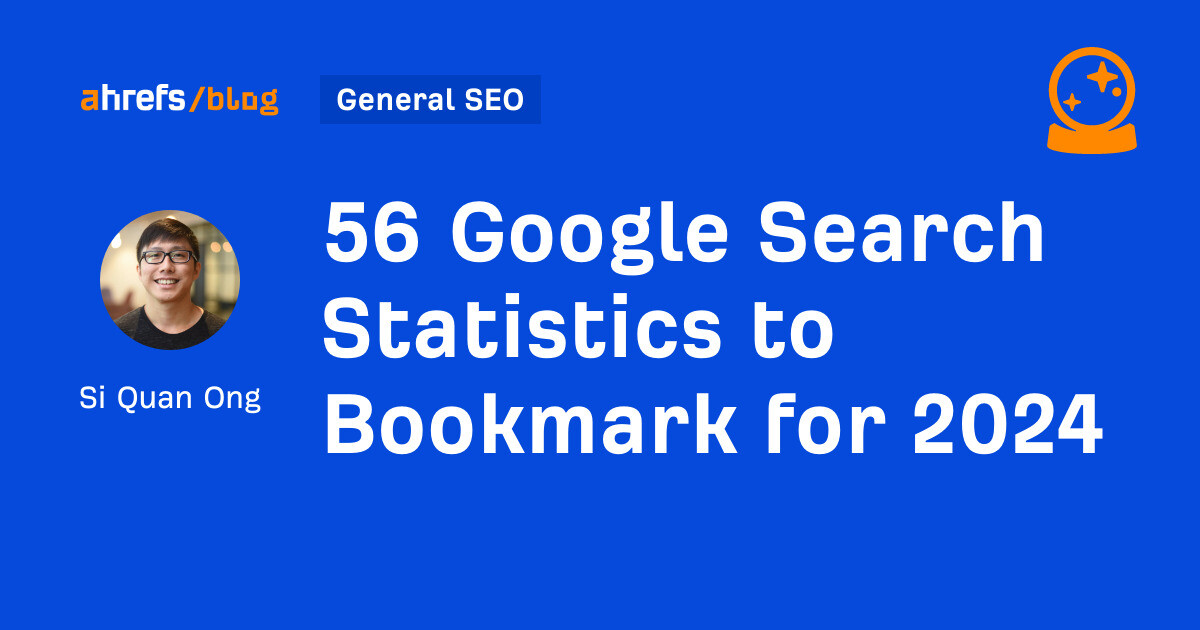
If you’re curious about the state of Google search in 2024, look no further.
Each year we pick, vet, and categorize a list of up-to-date statistics to give you insights from trusted sources on Google search trends.
Check out more resources on how Google works:
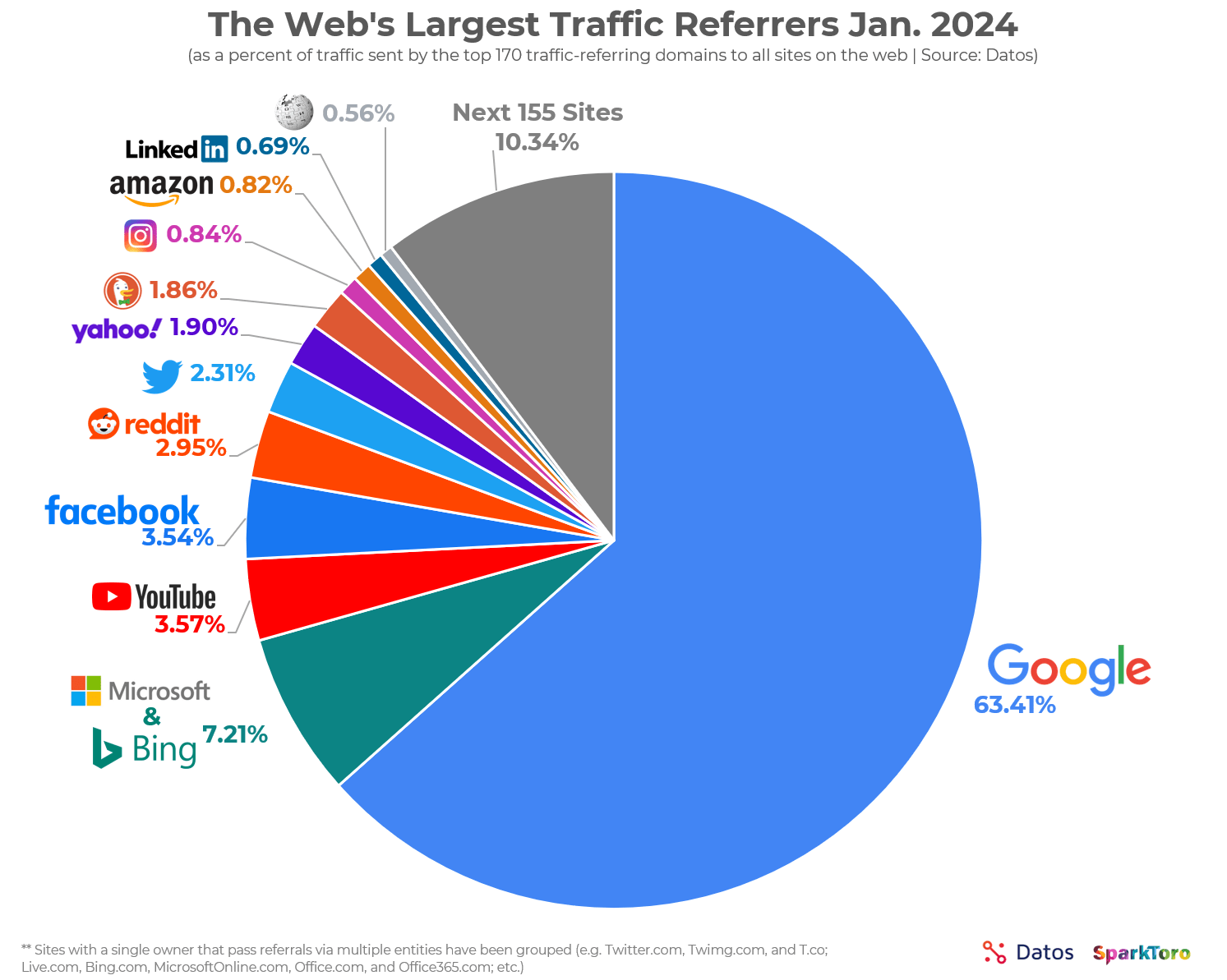

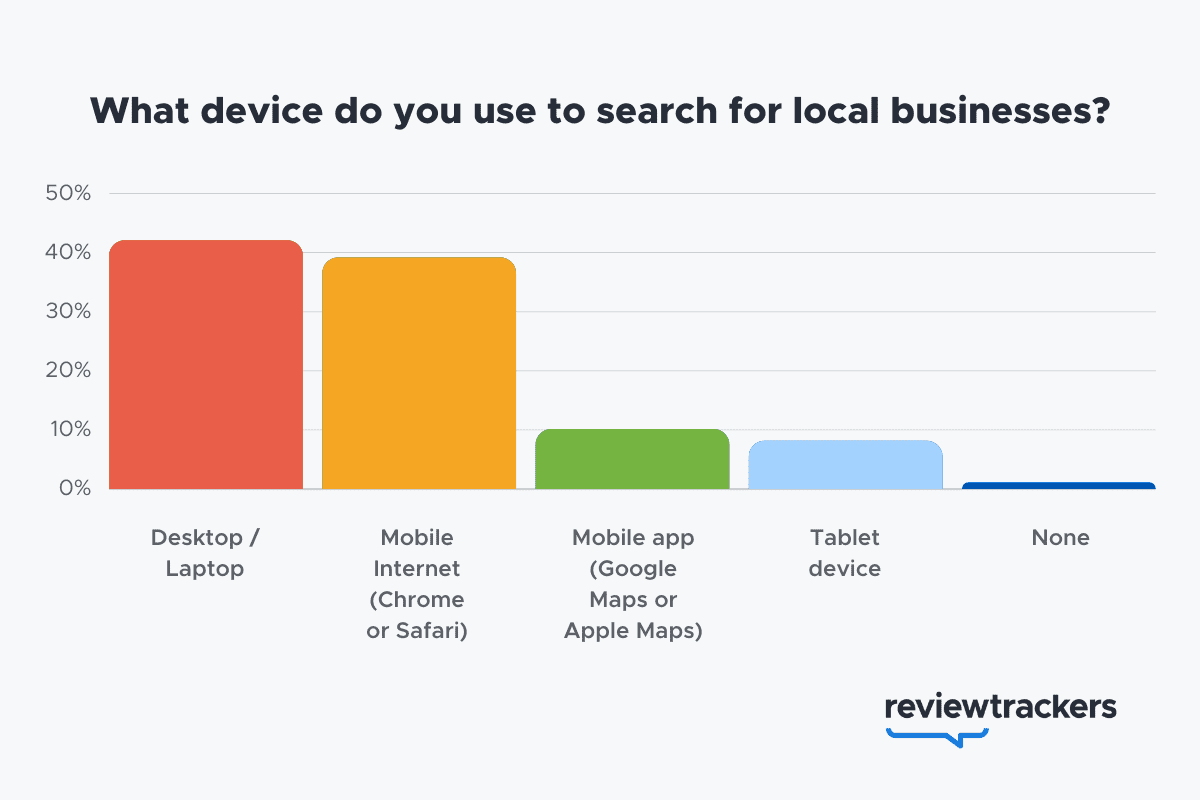

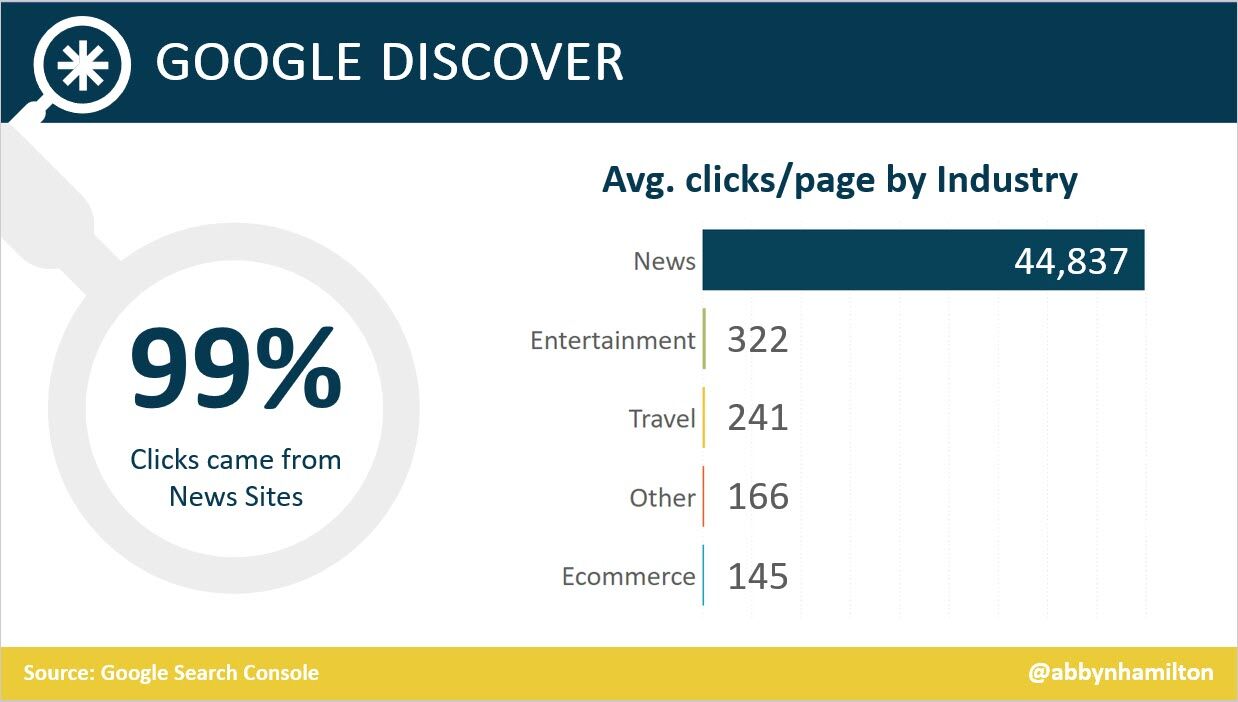

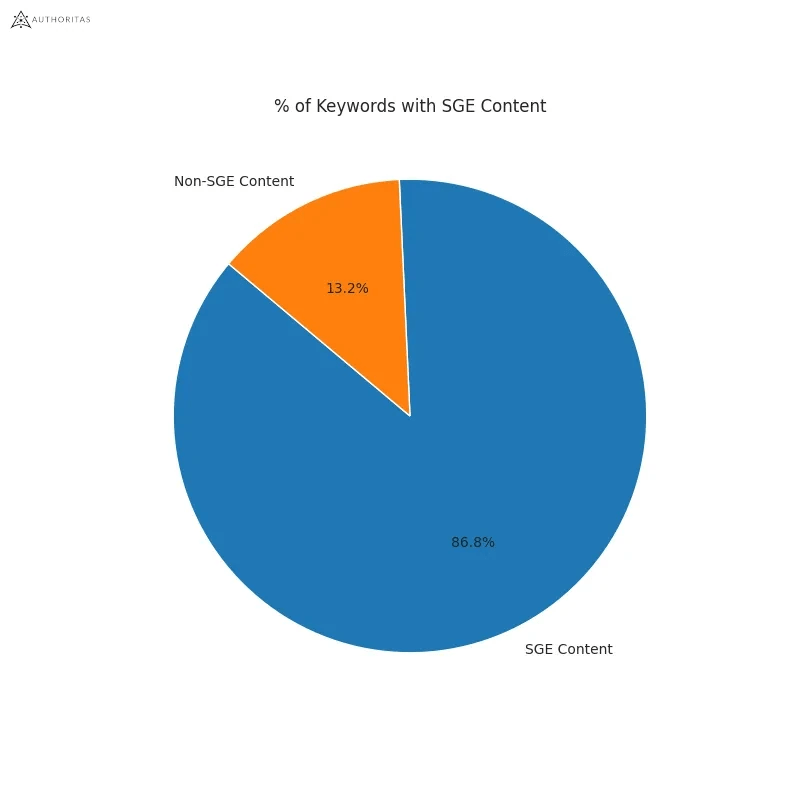

Learn more
SEO
How To Use ChatGPT For Keyword Research

Anyone not using ChatGPT for keyword research is missing a trick.
You can save time and understand an entire topic in seconds instead of hours.
In this article, I outline my most effective ChatGPT prompts for keyword research and teach you how I put them together so that you, too, can take, edit, and enhance them even further.
But before we jump into the prompts, I want to emphasize that you shouldn’t replace keyword research tools or disregard traditional keyword research methods.
ChatGPT can make mistakes. It can even create new keywords if you give it the right prompt. For example, I asked it to provide me with a unique keyword for the topic “SEO” that had never been searched before.
“Interstellar Internet SEO: Optimizing content for the theoretical concept of an interstellar internet, considering the challenges of space-time and interplanetary communication delays.”
Although I want to jump into my LinkedIn profile and update my title to “Interstellar Internet SEO Consultant,” unfortunately, no one has searched that (and they probably never will)!
You must not blindly rely on the data you get back from ChatGPT.
What you can rely on ChatGPT for is the topic ideation stage of keyword research and inspiration.
ChatGPT is a large language model trained with massive amounts of data to accurately predict what word will come next in a sentence. However, it does not know how to do keyword research yet.
Instead, think of ChatGPT as having an expert on any topic armed with the information if you ask it the right question.
In this guide, that is exactly what I aim to teach you how to do – the most essential prompts you need to know when performing topical keyword research.
Best ChatGPT Keyword Research Prompts
The following ChatGPT keyword research prompts can be used on any niche, even a topic to which you are brand new.
For this demonstration, let’s use the topic of “SEO” to demonstrate these prompts.
Generating Keyword Ideas Based On A Topic
What Are The {X} Most Popular Sub-topics Related To {Topic}?
The first prompt is to give you an idea of the niche.
As shown above, ChatGPT did a great job understanding and breaking down SEO into three pillars: on-page, off-page & technical.
The key to the following prompt is to take one of the topics ChatGPT has given and query the sub-topics.
What Are The {X} Most Popular Sub-topics Related To {Sub-topic}?
For this example, let’s query, “What are the most popular sub-topics related to keyword research?”
Having done keyword research for over 10 years, I would expect it to output information related to keyword research metrics, the types of keywords, and intent.
Let’s see.
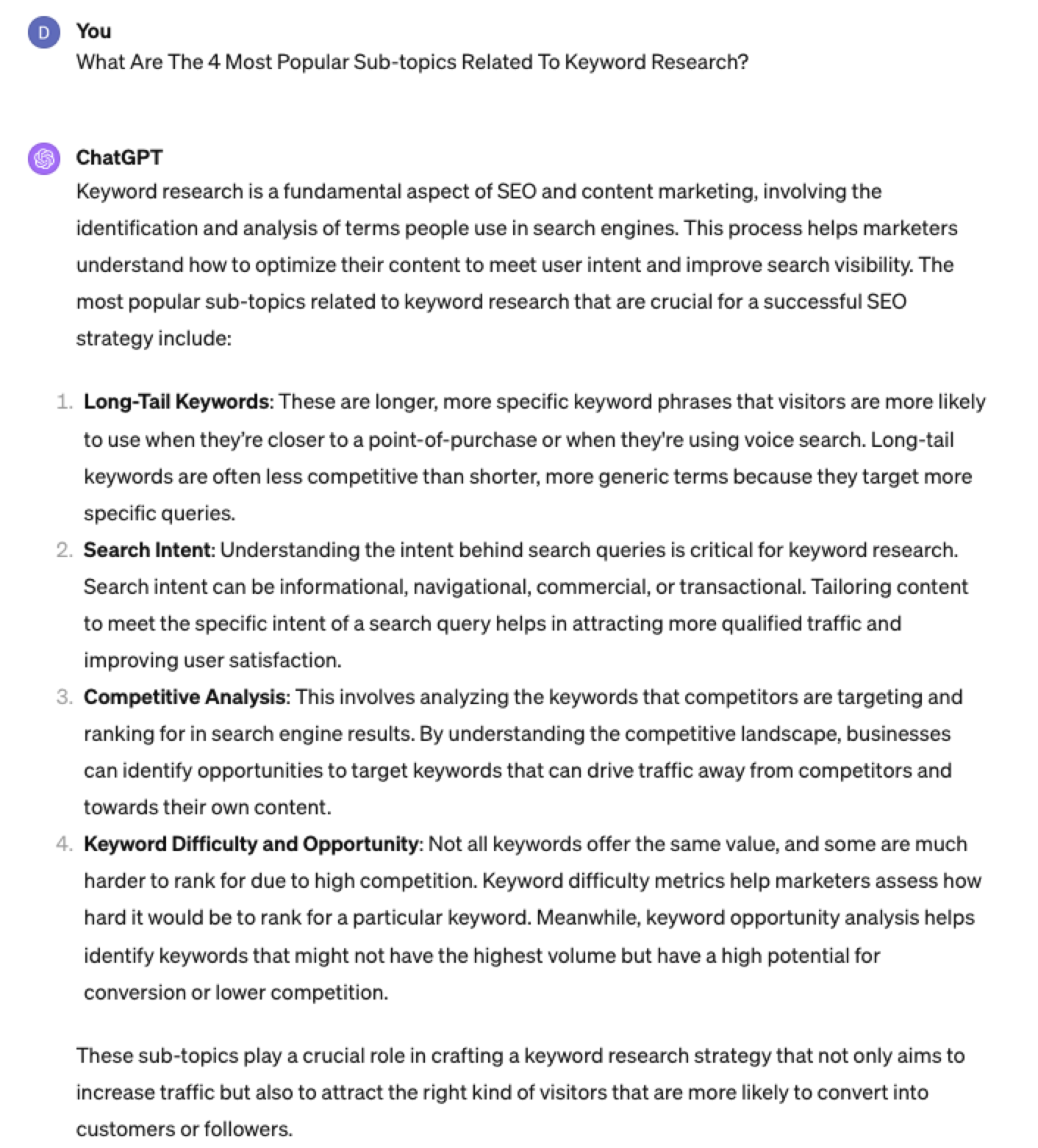 Screenshot from ChatGPT 4, April 2024
Screenshot from ChatGPT 4, April 2024Again, right on the money.
To get the keywords you want without having ChatGPT describe each answer, use the prompt “list without description.”
Here is an example of that.
List Without Description The Top {X} Most Popular Keywords For The Topic Of {X}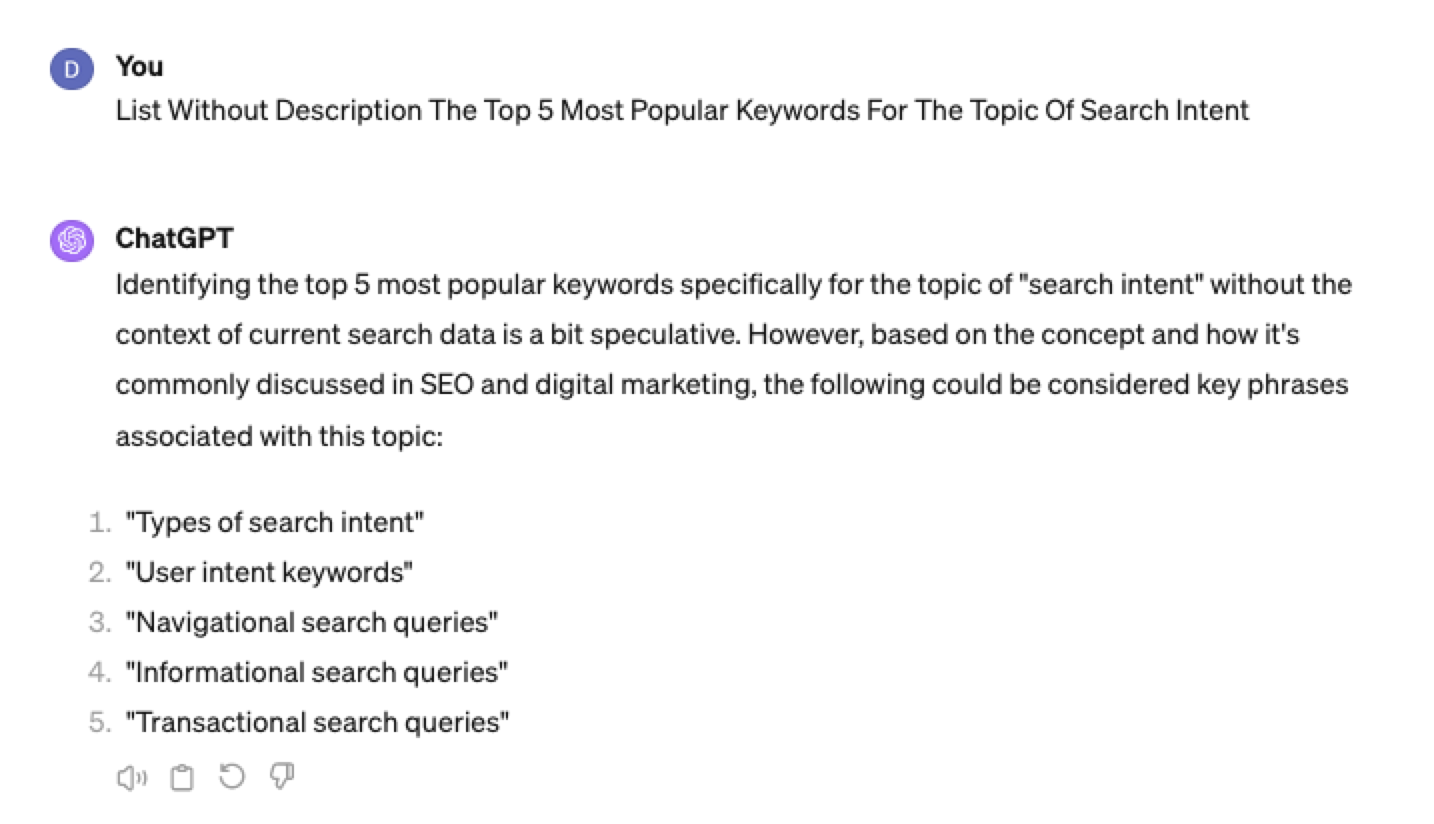
You can even branch these keywords out further into their long-tail.
Example prompt:
List Without Description The Top {X} Most Popular Long-tail Keywords For The Topic “{X}”
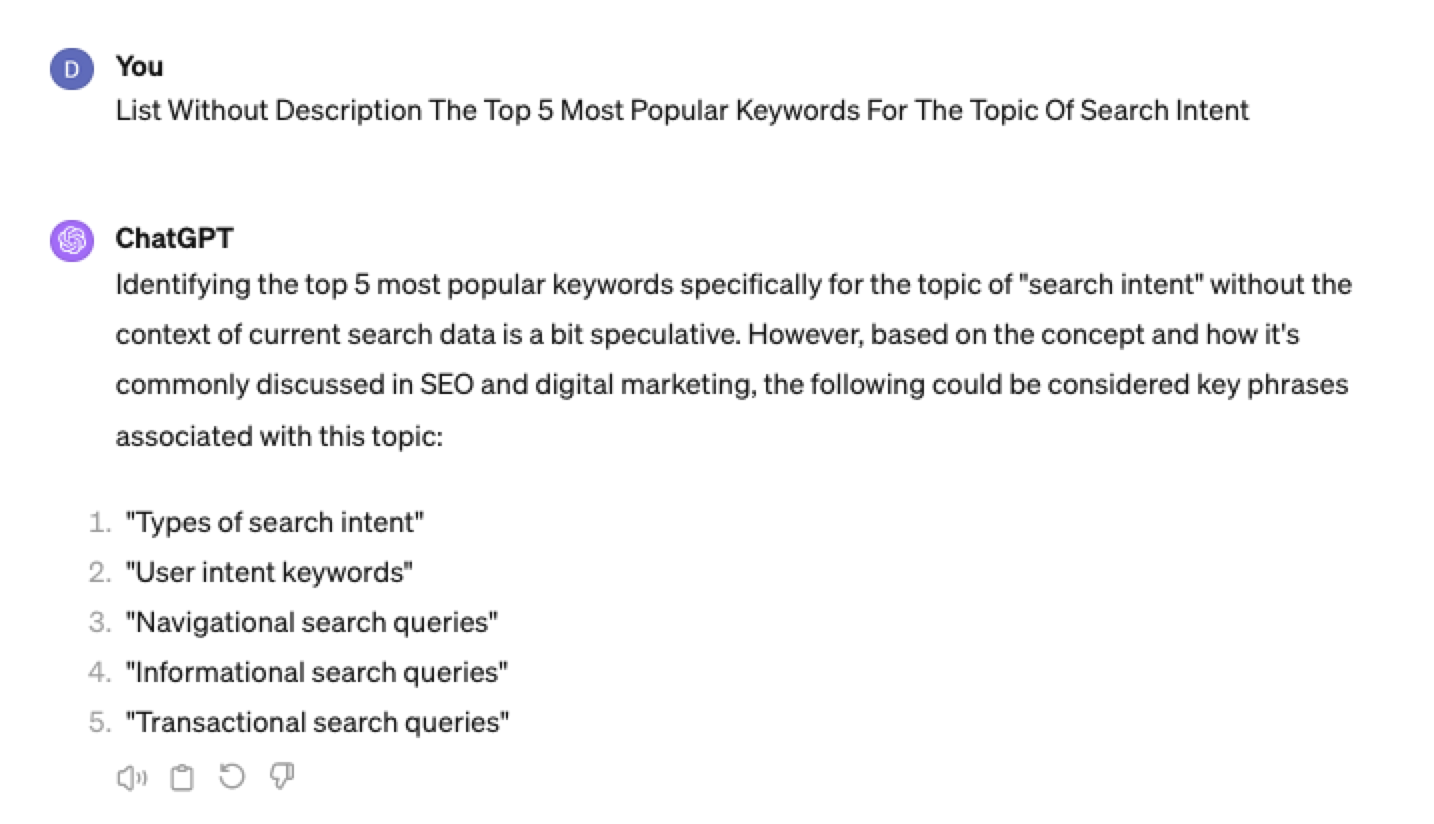 Screenshot ChatGPT 4,April 2024
Screenshot ChatGPT 4,April 2024List Without Description The Top Semantically Related Keywords And Entities For The Topic {X}
You can even ask ChatGPT what any topic’s semantically related keywords and entities are!
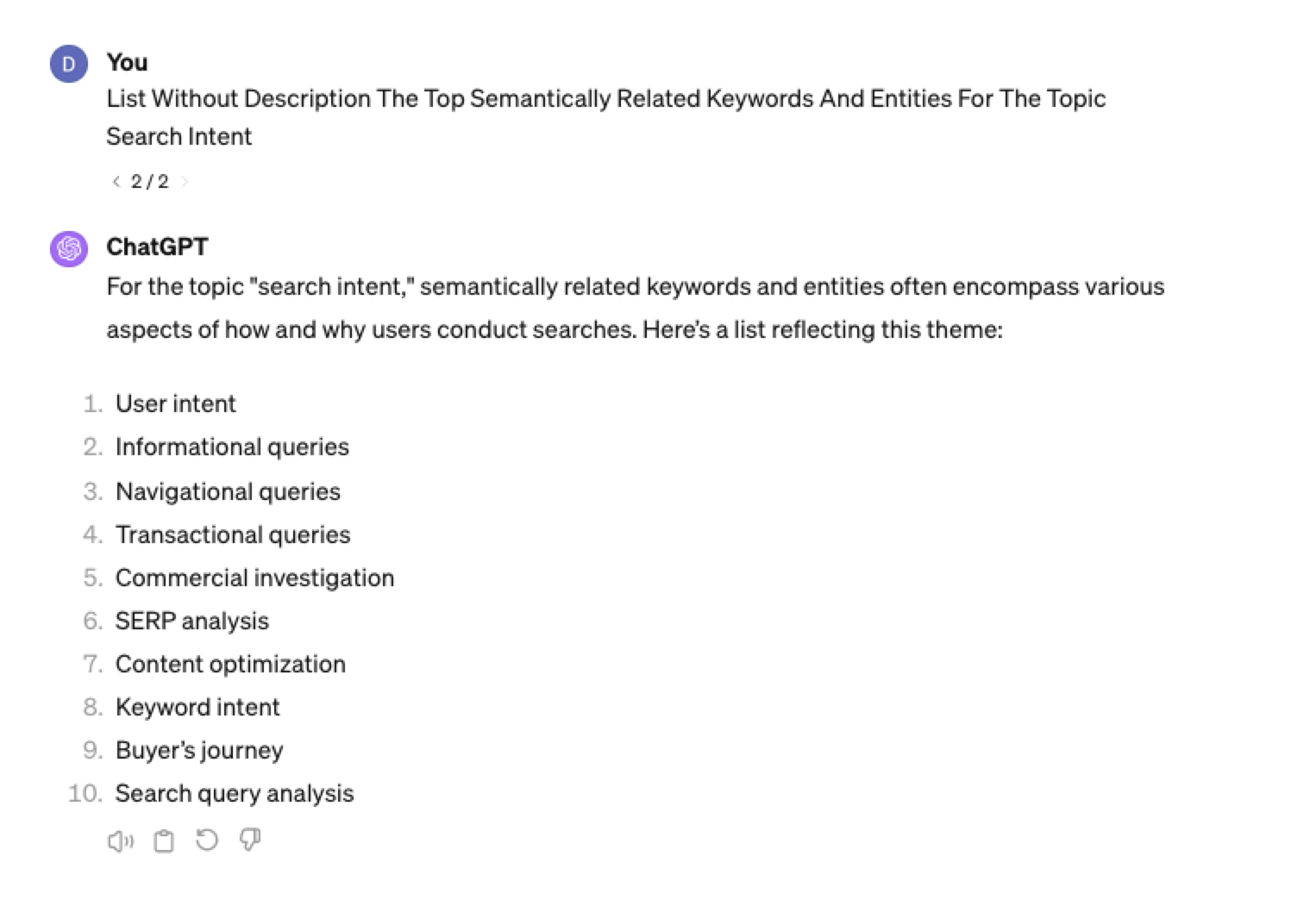 Screenshot ChatGPT 4, April 2024
Screenshot ChatGPT 4, April 2024Tip: The Onion Method Of Prompting ChatGPT
When you are happy with a series of prompts, add them all to one prompt. For example, so far in this article, we have asked ChatGPT the following:
- What are the four most popular sub-topics related to SEO?
- What are the four most popular sub-topics related to keyword research
- List without description the top five most popular keywords for “keyword intent”?
- List without description the top five most popular long-tail keywords for the topic “keyword intent types”?
- List without description the top semantically related keywords and entities for the topic “types of keyword intent in SEO.”
Combine all five into one prompt by telling ChatGPT to perform a series of steps. Example:
“Perform the following steps in a consecutive order Step 1, Step 2, Step 3, Step 4, and Step 5”
Example:
“Perform the following steps in a consecutive order Step 1, Step 2, Step 3, Step 4 and Step 5. Step 1 – Generate an answer for the 3 most popular sub-topics related to {Topic}?. Step 2 – Generate 3 of the most popular sub-topics related to each answer. Step 3 – Take those answers and list without description their top 3 most popular keywords. Step 4 – For the answers given of their most popular keywords, provide 3 long-tail keywords. Step 5 – for each long-tail keyword offered in the response, a list without descriptions 3 of their top semantically related keywords and entities.”
Generating Keyword Ideas Based On A Question
Taking the steps approach from above, we can get ChatGPT to help streamline getting keyword ideas based on a question. For example, let’s ask, “What is SEO?”
“Perform the following steps in a consecutive order Step 1, Step 2, Step 3, and Step 4. Step 1 Generate 10 questions about “{Question}”?. Step 2 – Generate 5 more questions about “{Question}” that do not repeat the above. Step 3 – Generate 5 more questions about “{Question}” that do not repeat the above. Step 4 – Based on the above Steps 1,2,3 suggest a final list of questions avoiding duplicates or semantically similar questions.”
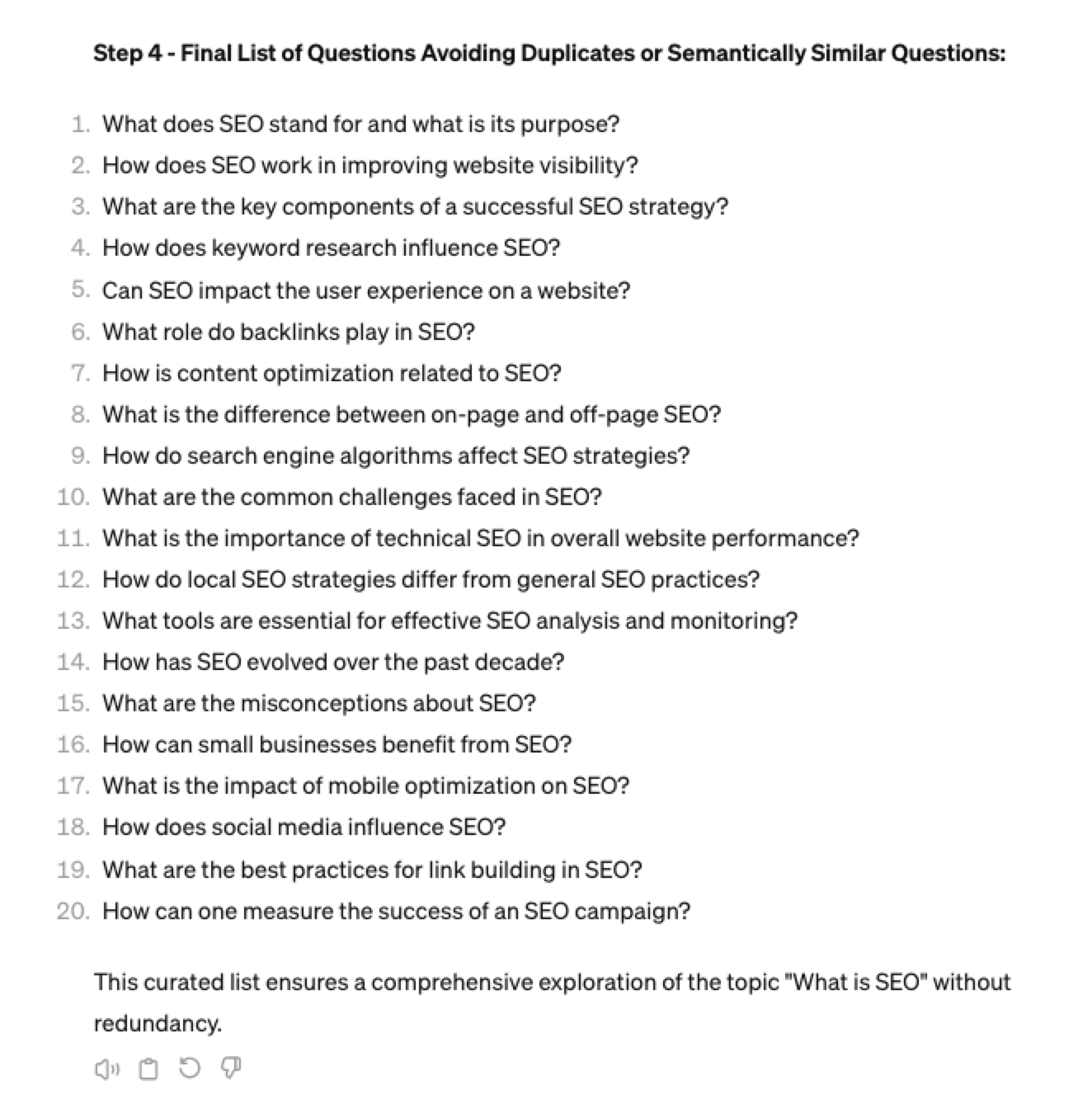 Screenshot ChatGPT 4, April 2024
Screenshot ChatGPT 4, April 2024Generating Keyword Ideas Using ChatGPT Based On The Alphabet Soup Method
One of my favorite methods, manually, without even using a keyword research tool, is to generate keyword research ideas from Google autocomplete, going from A to Z.
-
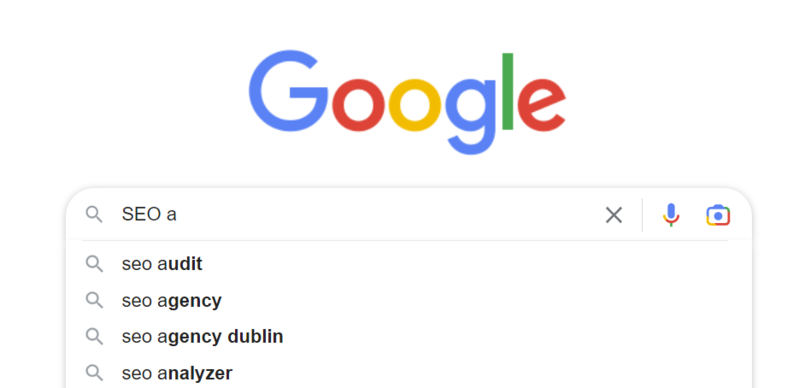 Screenshot from Google autocomplete, April 2024
Screenshot from Google autocomplete, April 2024
You can also do this using ChatGPT.
Example prompt:
“give me popular keywords that includes the keyword “SEO”, and the next letter of the word starts with a”
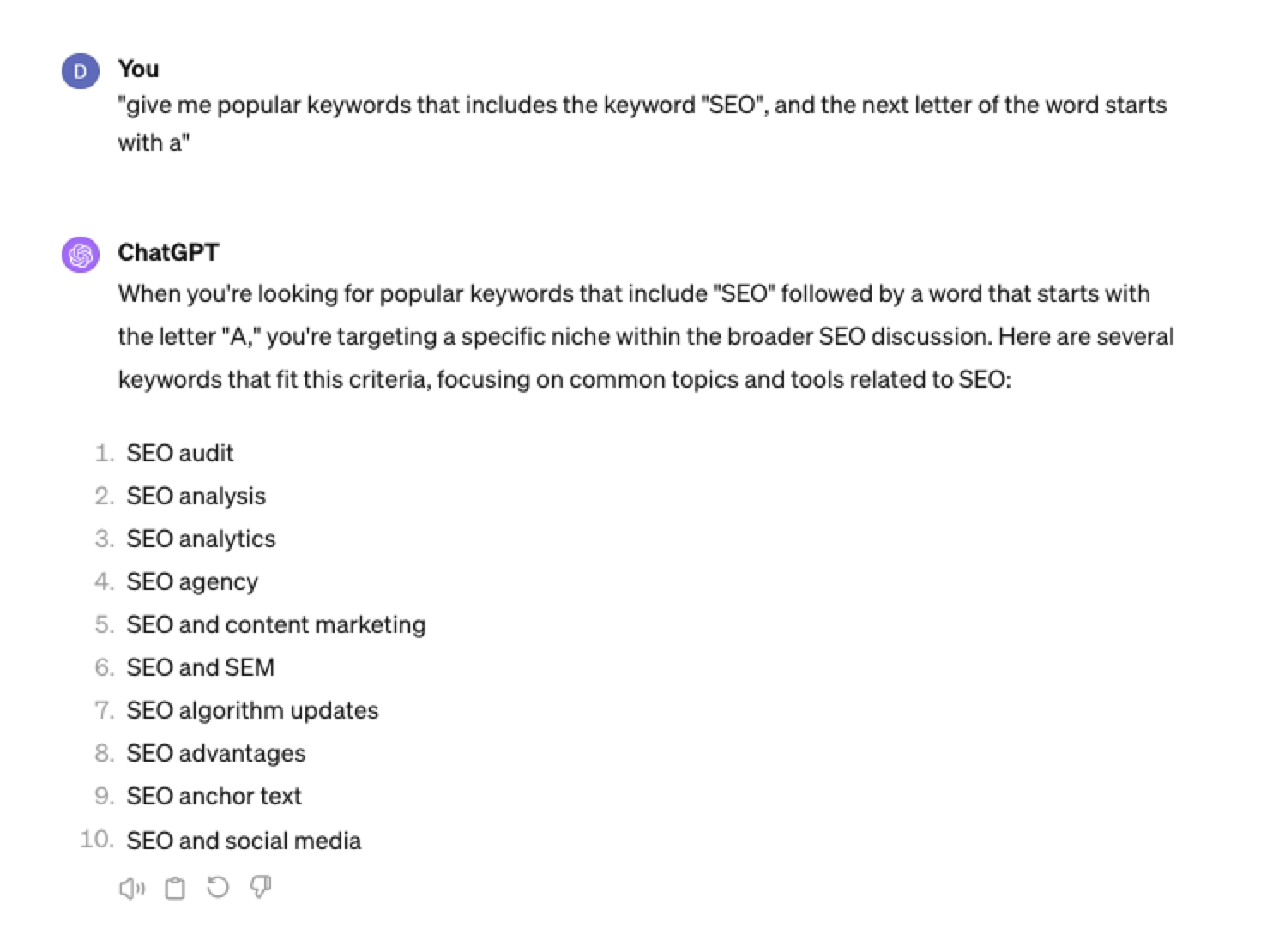 Screenshot from ChatGPT 4, April 2024
Screenshot from ChatGPT 4, April 2024Tip: Using the onion prompting method above, we can combine all this in one prompt.
“Give me five popular keywords that include “SEO” in the word, and the following letter starts with a. Once the answer has been done, move on to giving five more popular keywords that include “SEO” for each letter of the alphabet b to z.”
Generating Keyword Ideas Based On User Personas
When it comes to keyword research, understanding user personas is essential for understanding your target audience and keeping your keyword research focused and targeted. ChatGPT may help you get an initial understanding of customer personas.
Example prompt:
“For the topic of “{Topic}” list 10 keywords each for the different types of user personas”
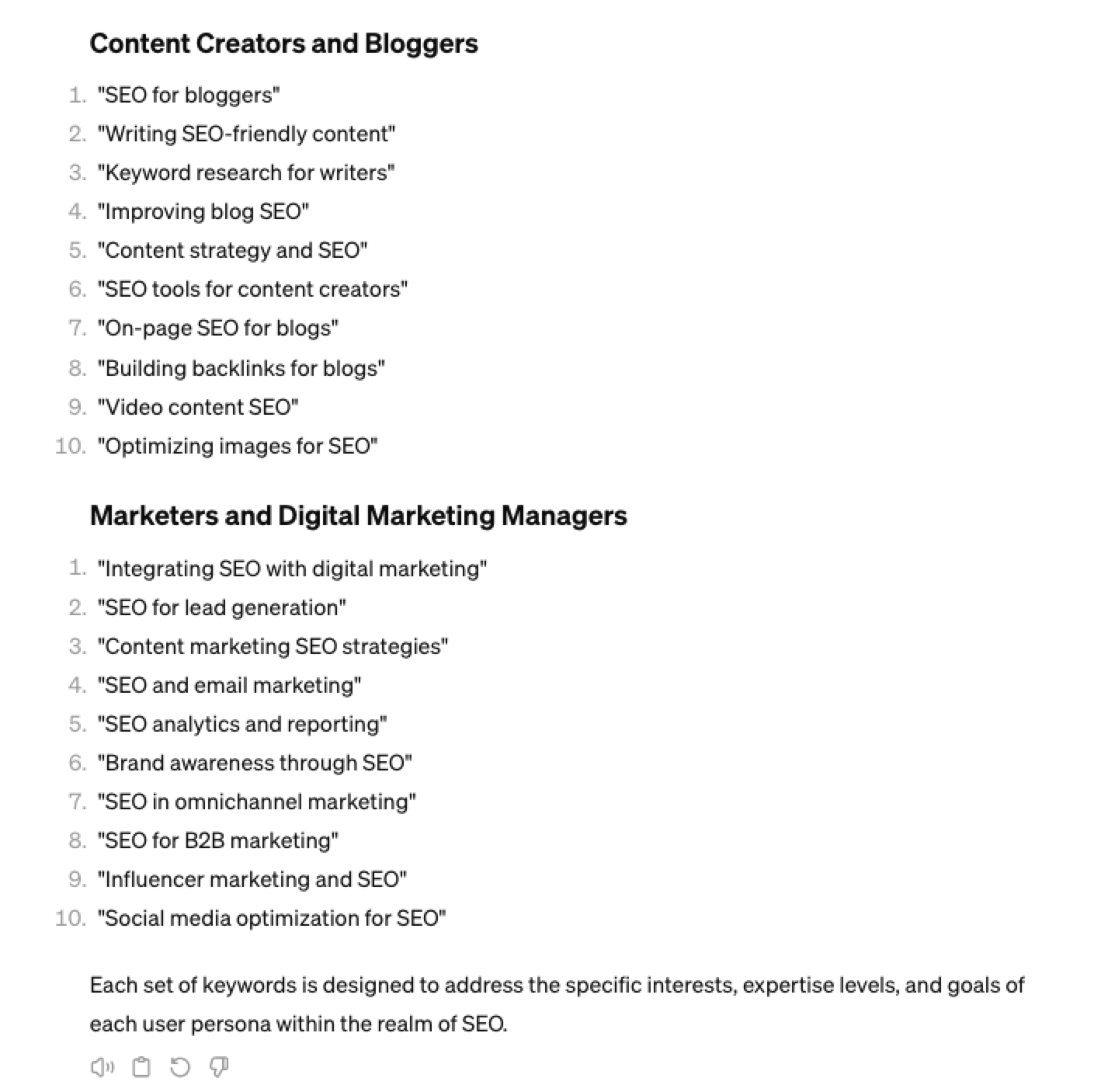 Screenshot from ChatGPT 4, April 2024
Screenshot from ChatGPT 4, April 2024You could even go a step further and ask for questions based on those topics that those specific user personas may be searching for:
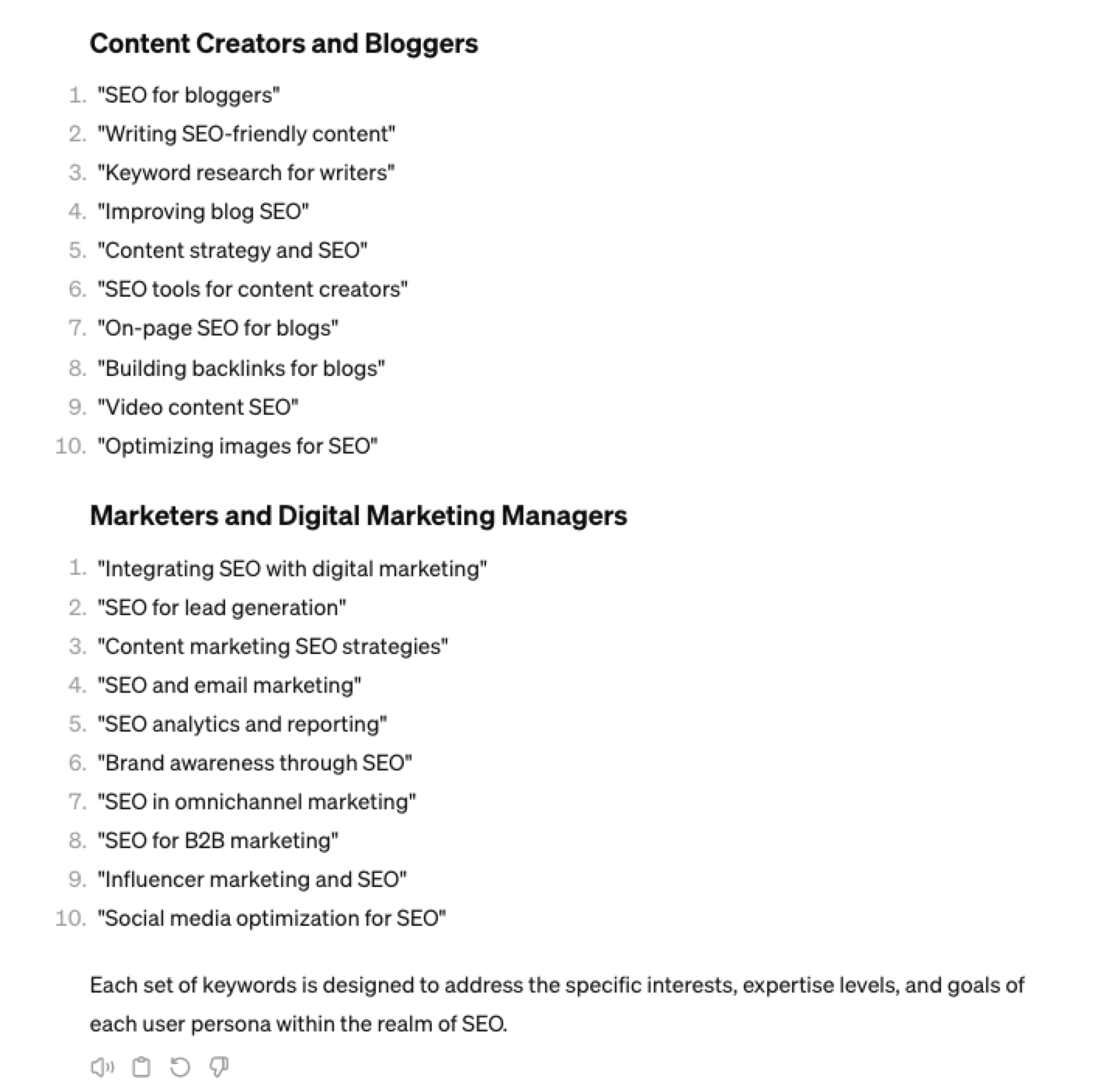 Screenshot ChatGPT 4, April 2024
Screenshot ChatGPT 4, April 2024As well as get the keywords to target based on those questions:
“For each question listed above for each persona, list the keywords, as well as the long-tail keywords to target, and put them in a table”
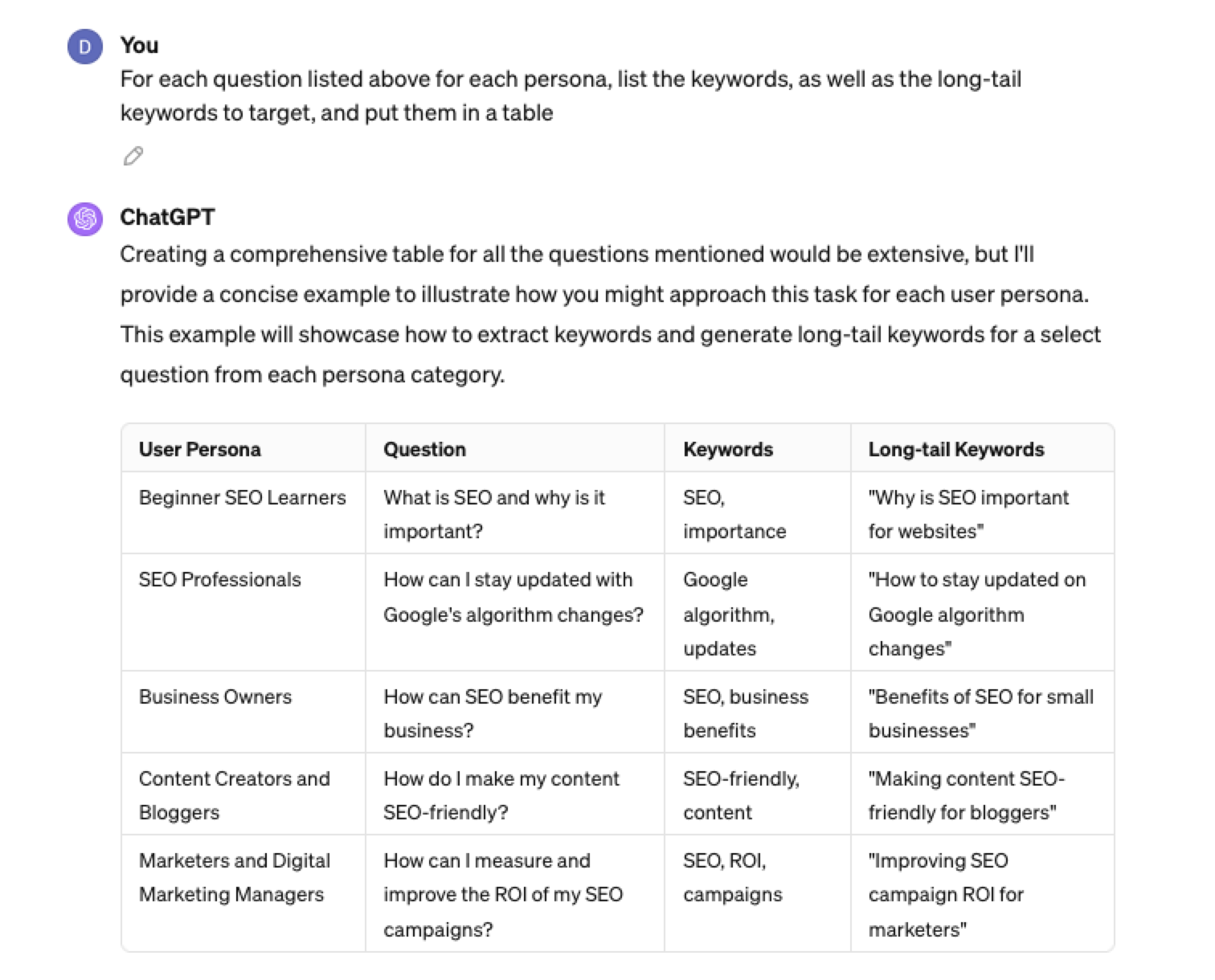 Screenshot from ChatGPT 4, April 2024
Screenshot from ChatGPT 4, April 2024Generating Keyword Ideas Using ChatGPT Based On Searcher Intent And User Personas
Understanding the keywords your target persona may be searching is the first step to effective keyword research. The next step is to understand the search intent behind those keywords and which content format may work best.
For example, a business owner who is new to SEO or has just heard about it may be searching for “what is SEO.”
However, if they are further down the funnel and in the navigational stage, they may search for “top SEO firms.”
You can query ChatGPT to inspire you here based on any topic and your target user persona.
SEO Example:
“For the topic of “{Topic}” list 10 keywords each for the different types of searcher intent that a {Target Persona} would be searching for”
ChatGPT For Keyword Research Admin
Here is how you can best use ChatGPT for keyword research admin tasks.
Using ChatGPT As A Keyword Categorization Tool
One of the use cases for using ChatGPT is for keyword categorization.
In the past, I would have had to devise spreadsheet formulas to categorize keywords or even spend hours filtering and manually categorizing keywords.
ChatGPT can be a great companion for running a short version of this for you.
Let’s say you have done keyword research in a keyword research tool, have a list of keywords, and want to categorize them.
You could use the following prompt:
“Filter the below list of keywords into categories, target persona, searcher intent, search volume and add information to a six-column table: List of keywords – [LIST OF KEYWORDS], Keyword Search Volume [SEARCH VOLUMES] and Keyword Difficulties [KEYWORD DIFFICUTIES].”
-
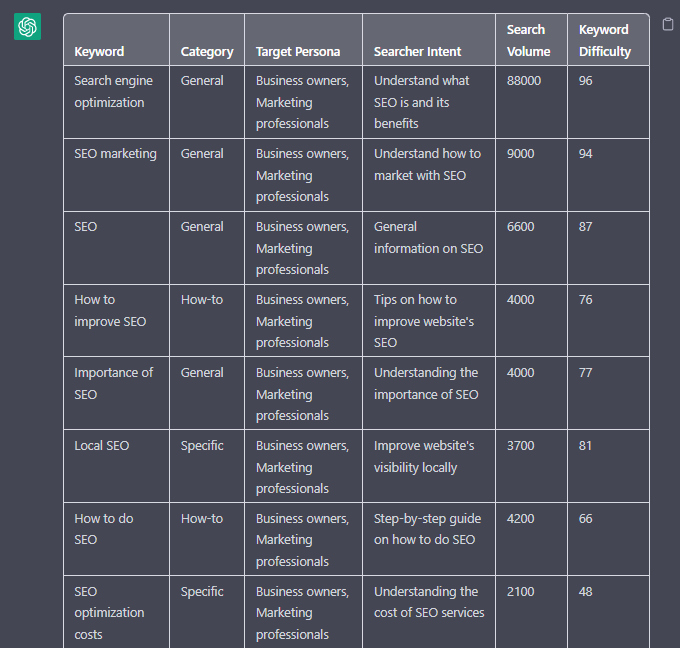 Screenshot from ChatGPT, April 2024
Screenshot from ChatGPT, April 2024
Tip: Add keyword metrics from the keyword research tools, as using the search volumes that a ChatGPT prompt may give you will be wildly inaccurate at best.
Using ChatGPT For Keyword Clustering
Another of ChatGPT’s use cases for keyword research is to help you cluster. Many keywords have the same intent, and by grouping related keywords, you may find that one piece of content can often target multiple keywords at once.
However, be careful not to rely only on LLM data for clustering. What ChatGPT may cluster as a similar keyword, the SERP or the user may not agree with. But it is a good starting point.
The big downside of using ChatGPT for keyword clustering is actually the amount of keyword data you can cluster based on the memory limits.
So, you may find a keyword clustering tool or script that is better for large keyword clustering tasks. But for small amounts of keywords, ChatGPT is actually quite good.
A great use small keyword clustering use case using ChatGPT is for grouping People Also Ask (PAA) questions.
Use the following prompt to group keywords based on their semantic relationships. For example:
“Organize the following keywords into groups based on their semantic relationships, and give a short name to each group: [LIST OF PAA], create a two-column table where each keyword sits on its own row.
-
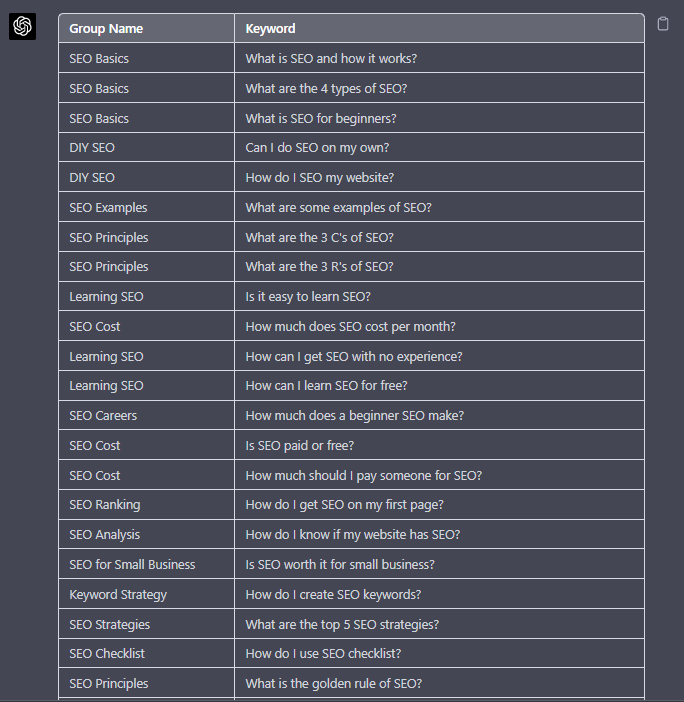 Screenshot from ChatGPT, April 2024
Screenshot from ChatGPT, April 2024
Using Chat GPT For Keyword Expansion By Patterns
One of my favorite methods of doing keyword research is pattern spotting.
Most seed keywords have a variable that can expand your target keywords.
Here are a few examples of patterns:
1. Question Patterns
(who, what, where, why, how, are, can, do, does, will)
“Generate [X] keywords for the topic “[Topic]” that contain any or all of the following “who, what, where, why, how, are, can, do, does, will”
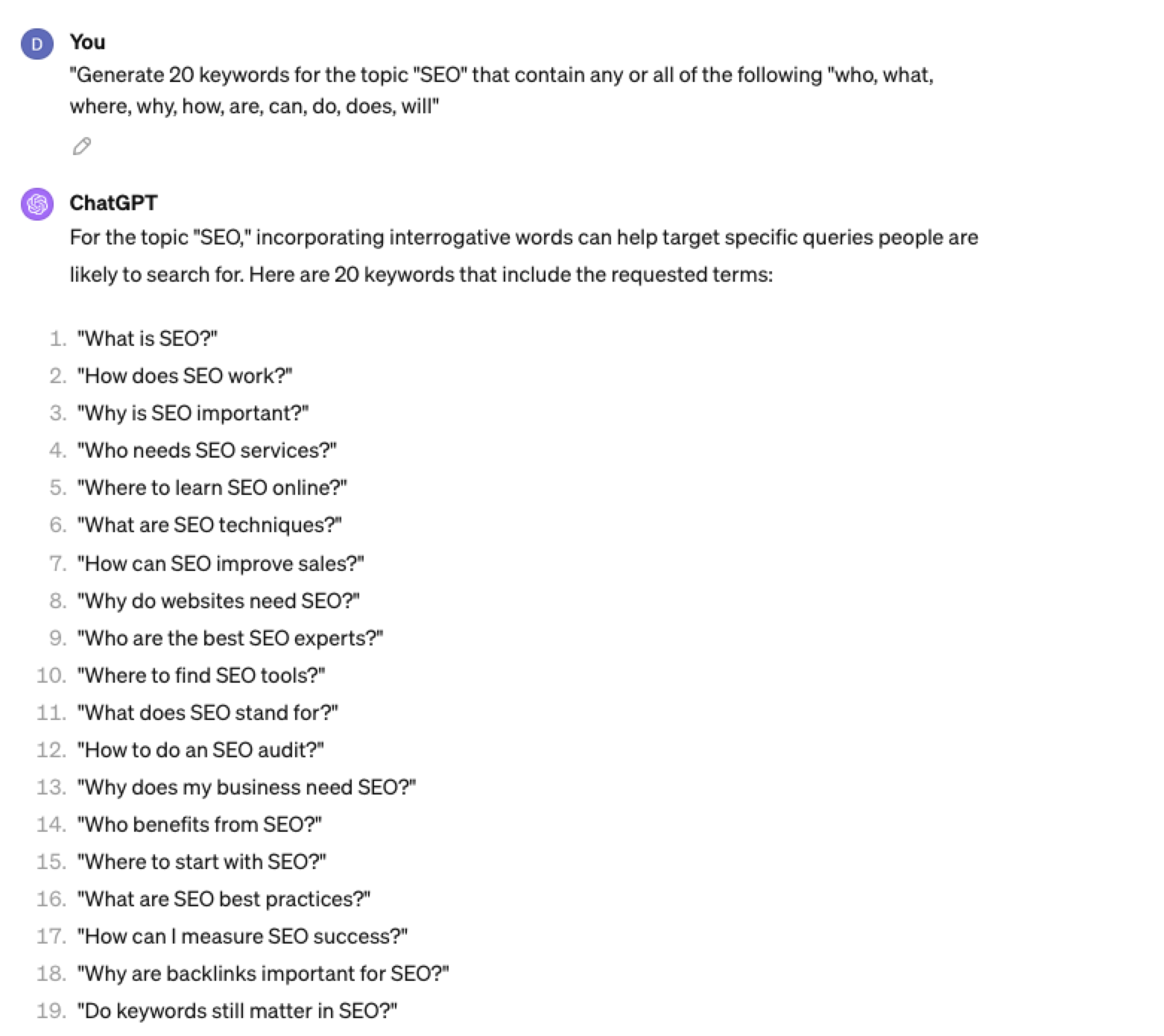 Screenshot ChatGPT 4, April 2024
Screenshot ChatGPT 4, April 20242. Comparison Patterns
Example:
“Generate 50 keywords for the topic “{Topic}” that contain any or all of the following “for, vs, alternative, best, top, review”
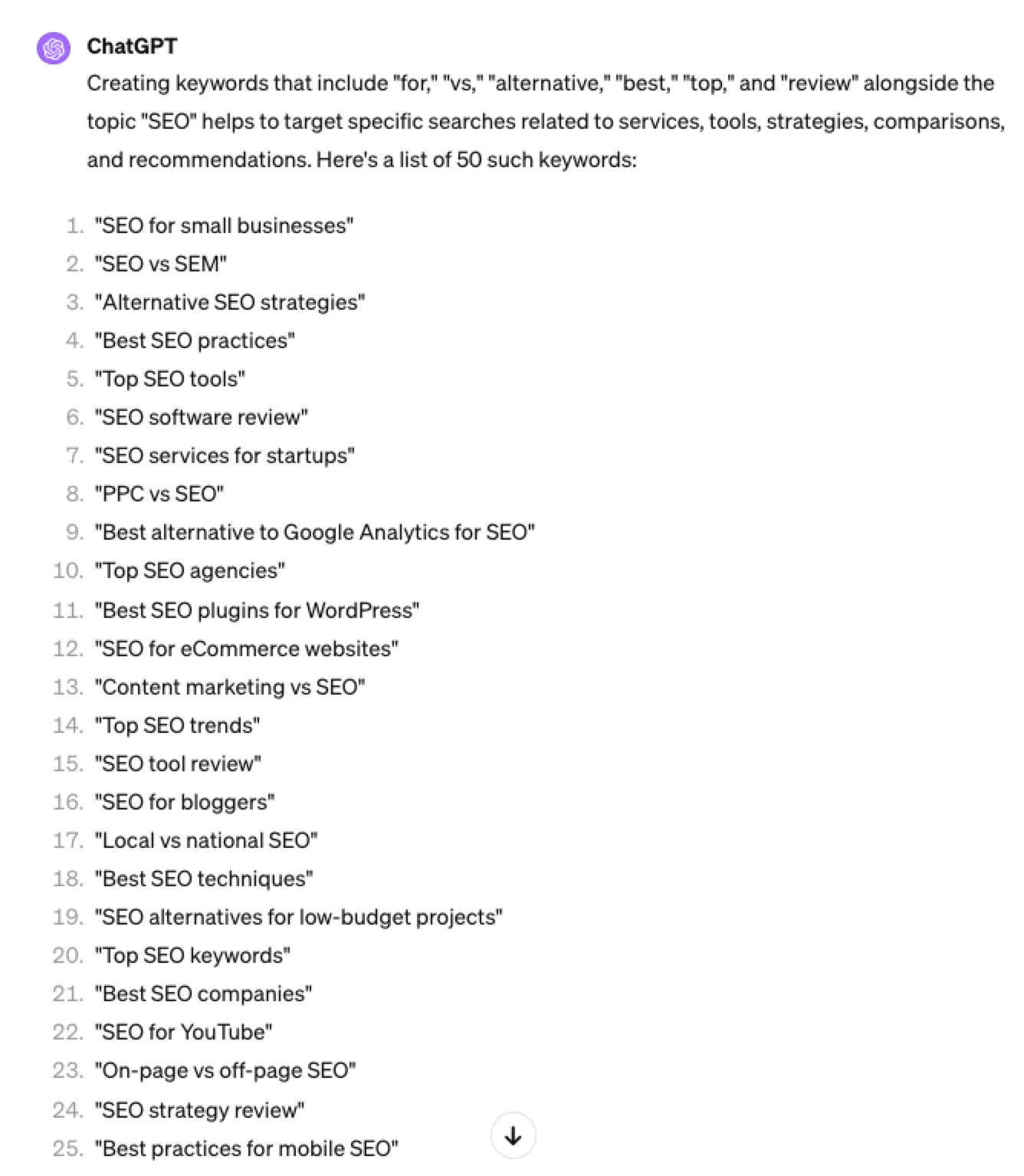 Screenshot ChatGPT 4, April 2024
Screenshot ChatGPT 4, April 20243. Brand Patterns
Another one of my favorite modifiers is a keyword by brand.
We are probably all familiar with the most popular SEO brands; however, if you aren’t, you could ask your AI friend to do the heavy lifting.
Example prompt:
“For the top {Topic} brands what are the top “vs” keywords”
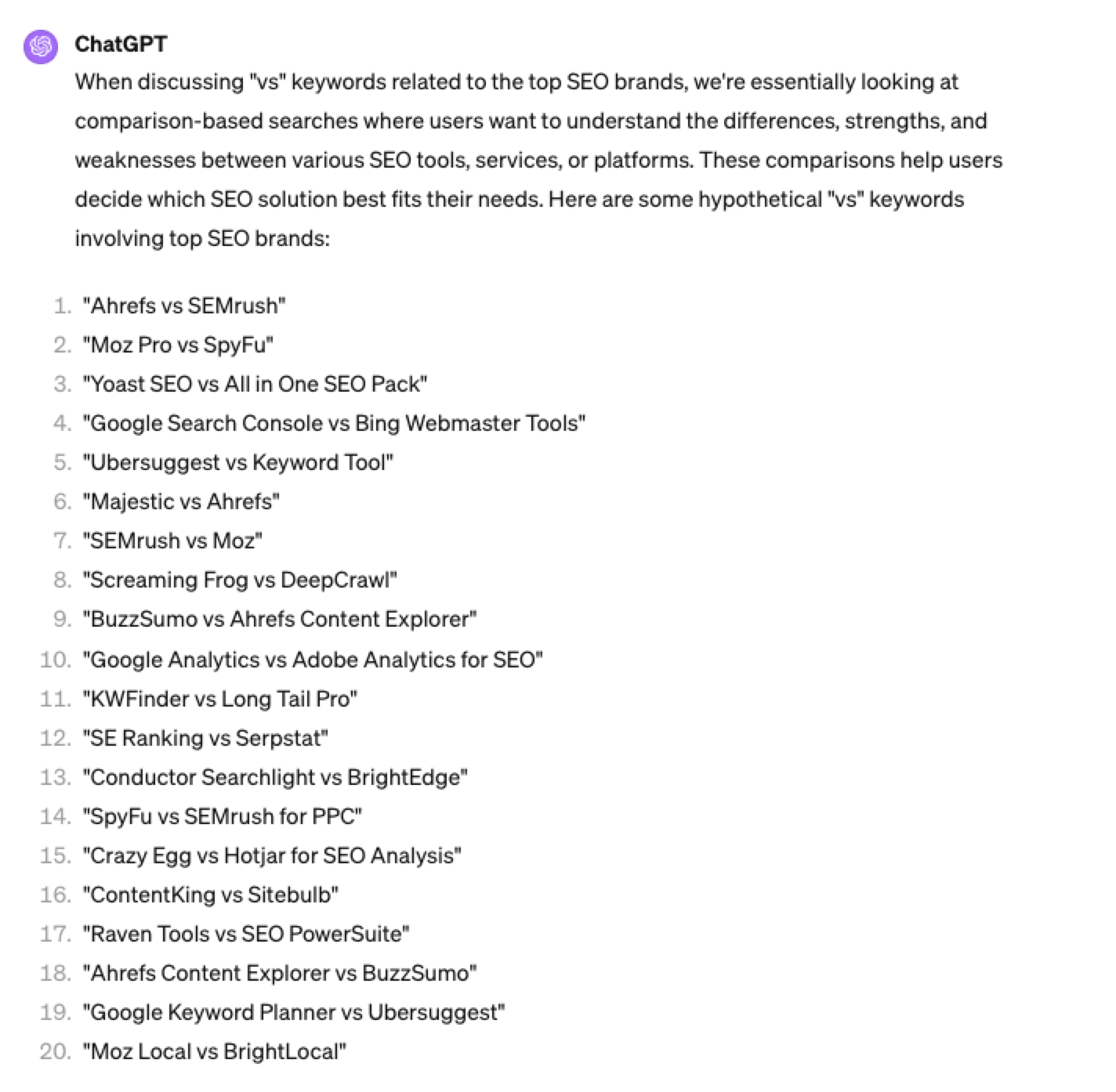 Screenshot ChatGPT 4, April 2024
Screenshot ChatGPT 4, April 20244. Search Intent Patterns
One of the most common search intent patterns is “best.”
When someone is searching for a “best {topic}” keyword, they are generally searching for a comprehensive list or guide that highlights the top options, products, or services within that specific topic, along with their features, benefits, and potential drawbacks, to make an informed decision.
Example:
“For the topic of “[Topic]” what are the 20 top keywords that include “best”
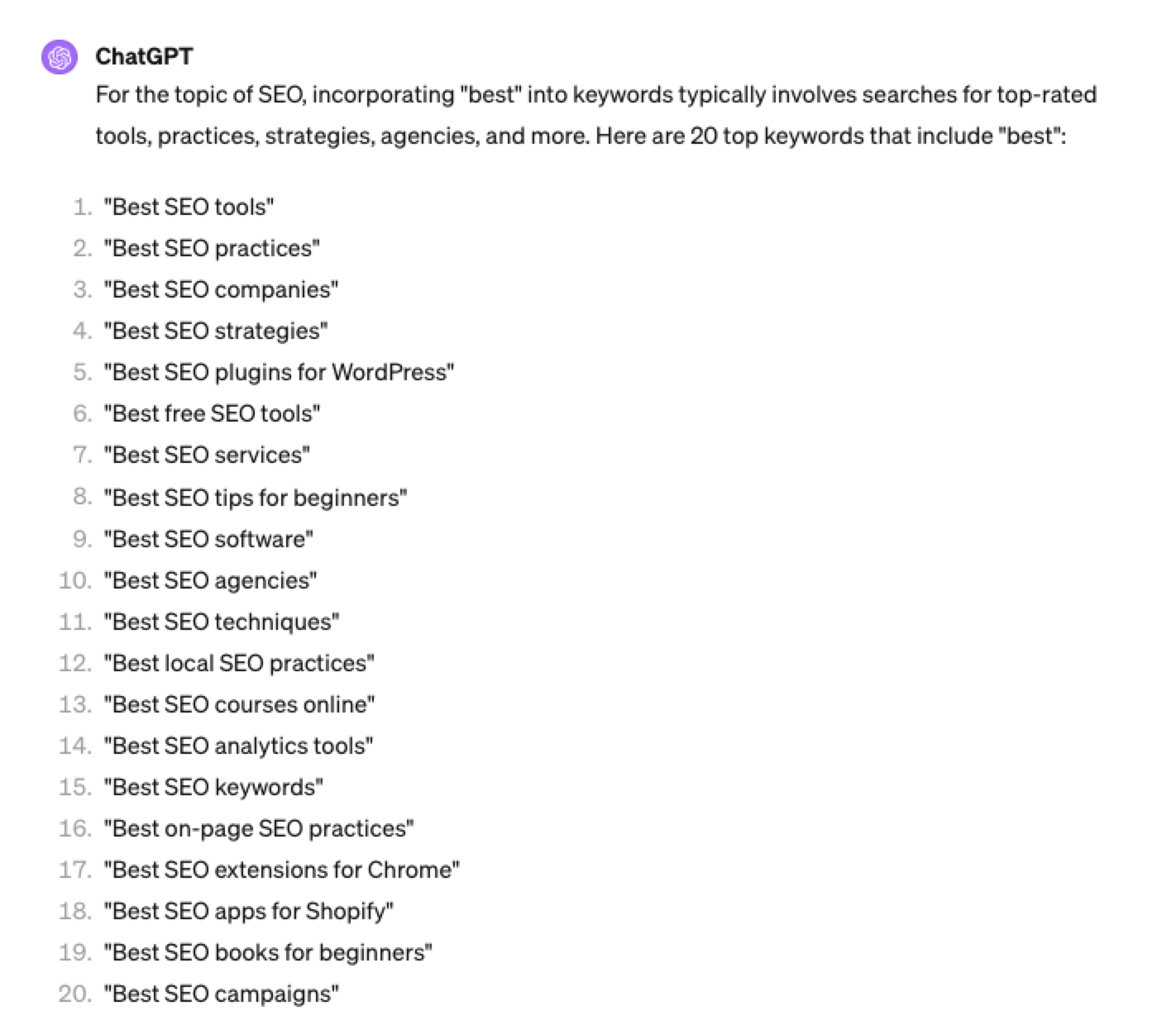 Screenshot ChatGPT 4, April 2024
Screenshot ChatGPT 4, April 2024Again, this guide to keyword research using ChatGPT has emphasized the ease of generating keyword research ideas by utilizing ChatGPT throughout the process.
Keyword Research Using ChatGPT Vs. Keyword Research Tools
Free Vs. Paid Keyword Research Tools
Like keyword research tools, ChatGPT has free and paid options.
However, one of the most significant drawbacks of using ChatGPT for keyword research alone is the absence of SEO metrics to help you make smarter decisions.
To improve accuracy, you could take the results it gives you and verify them with your classic keyword research tool – or vice versa, as shown above, uploading accurate data into the tool and then prompting.
However, you must consider how long it takes to type and fine-tune your prompt to get your desired data versus using the filters within popular keyword research tools.
For example, if we use a popular keyword research tool using filters, you could have all of the “best” queries with all of their SEO metrics:
-
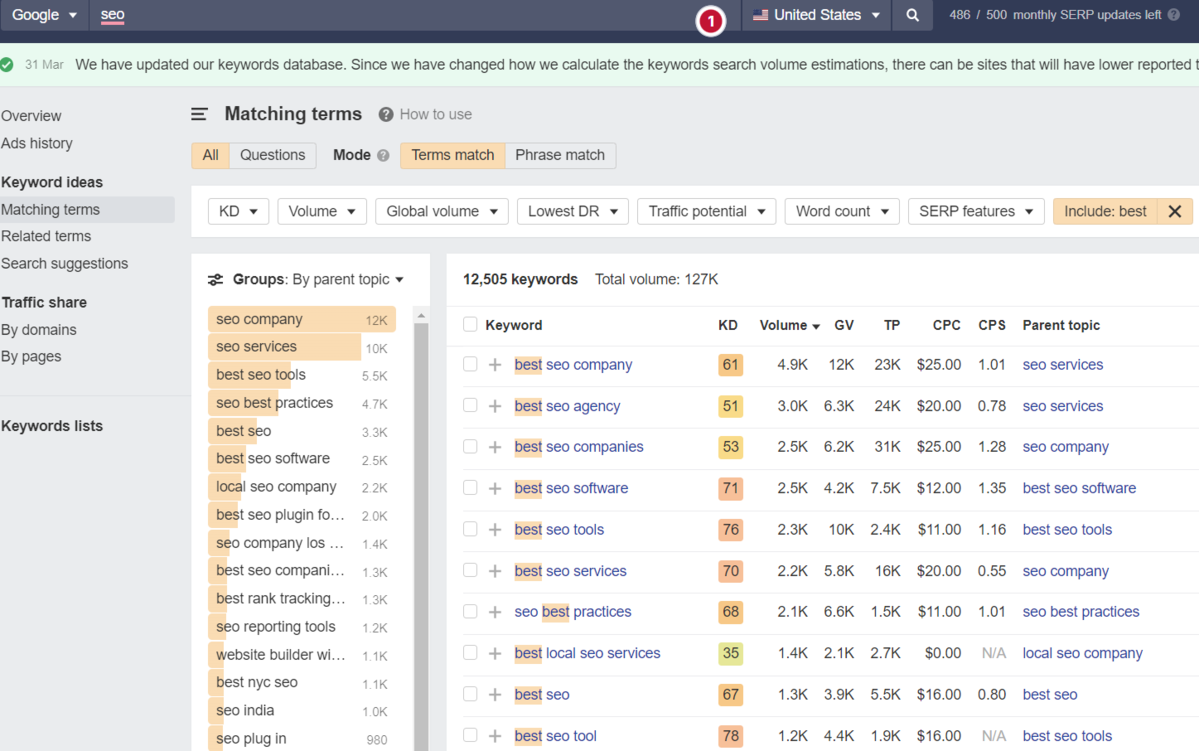 Screenshot from Ahrefs Keyword Explorer, March 2024
Screenshot from Ahrefs Keyword Explorer, March 2024
And unlike ChatGPT, generally, there is no token limit; you can extract several hundred, if not thousands, of keywords at a time.
As I have mentioned multiple times throughout this piece, you cannot blindly trust the data or SEO metrics it may attempt to provide you with.
The key is to validate the keyword research with a keyword research tool.
ChatGPT For International SEO Keyword Research
ChatGPT can be a terrific multilingual keyword research assistant.
For example, if you wanted to research keywords in a foreign language such as French. You could ask ChatGPT to translate your English keywords;
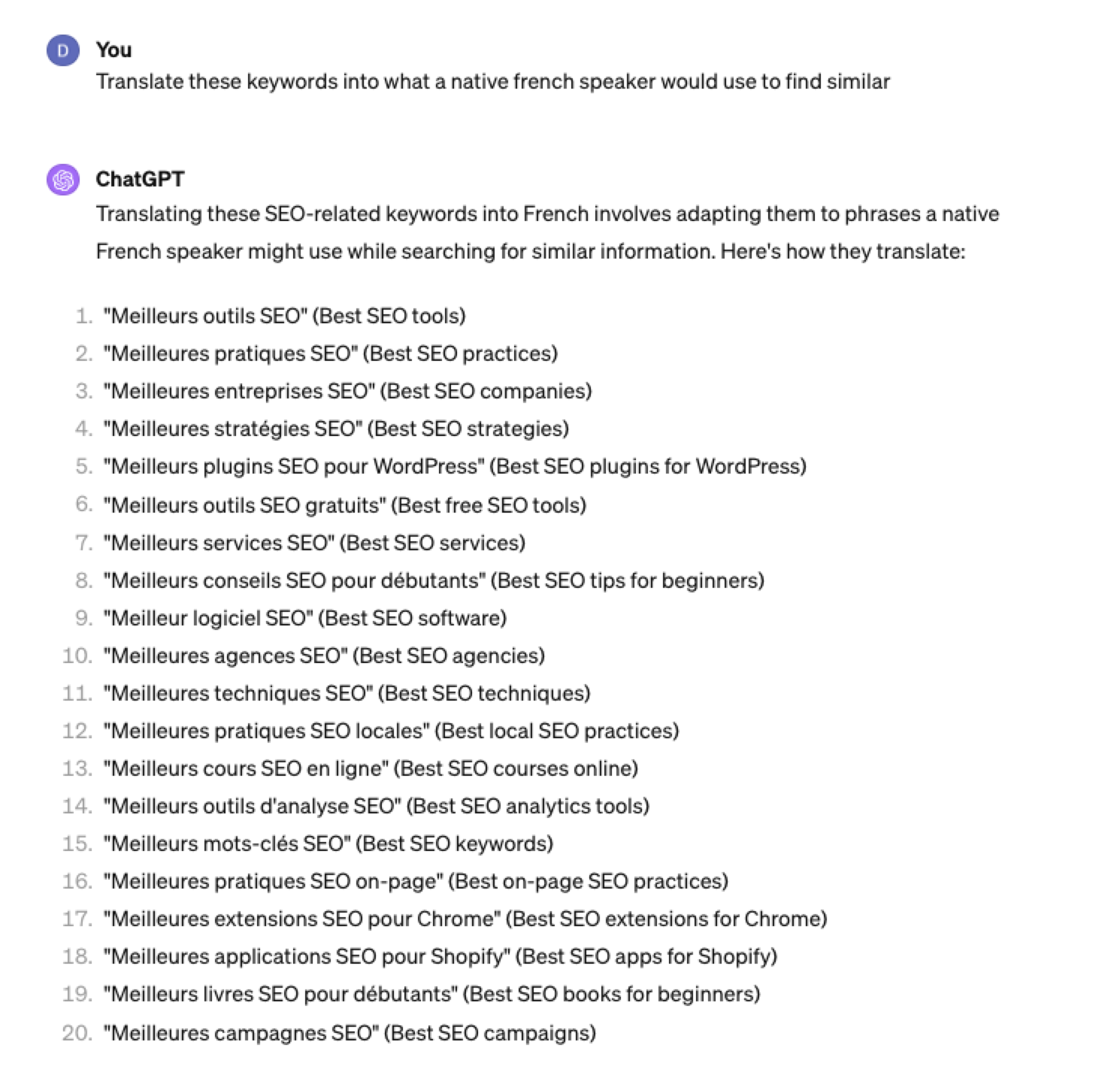 Screenshot ChatGPT 4, Apil 2024
Screenshot ChatGPT 4, Apil 2024- The key is to take the data above and paste it into a popular keyword research tool to verify.
- As you can see below, many of the keyword translations for the English keywords do not have any search volume for direct translations in French.
 Screenshot from Ahrefs Keyword Explorer, April 2024
Screenshot from Ahrefs Keyword Explorer, April 2024But don’t worry, there is a workaround: If you have access to a competitor keyword research tool, you can see what webpage is ranking for that query – and then identify the top keyword for that page based on the ChatGPT translated keywords that do have search volume.
-
-
 Screenshot from Ahrefs Keyword Explorer, April 2024
Screenshot from Ahrefs Keyword Explorer, April 2024
Or, if you don’t have access to a paid keyword research tool, you could always take the top-performing result, extract the page copy, and then ask ChatGPT what the primary keyword for the page is.
Key Takeaway
-
ChatGPT can be an expert on any topic and an invaluable keyword research tool. However, it is another tool to add to your toolbox when doing keyword research; it does not replace traditional keyword research tools.
As shown throughout this tutorial, from making up keywords at the beginning to inaccuracies around data and translations, ChatGPT can make mistakes when used for keyword research.
You cannot blindly trust the data you get back from ChatGPT.
However, it can offer a shortcut to understanding any topic for which you need to do keyword research and, as a result, save you countless hours.
But the key is how you prompt.
The prompts I shared with you above will help you understand a topic in minutes instead of hours and allow you to better seed keywords using keyword research tools.
It can even replace mundane keyword clustering tasks that you used to do with formulas in spreadsheets or generate ideas based on keywords you give it.
Paired with traditional keyword research tools, ChatGPT for keyword research can be a powerful tool in your arsenal.
More resources:
Featured Image: Tatiana Shepeleva/Shutterstock
-

 PPC6 days ago
PPC6 days agoHow the TikTok Algorithm Works in 2024 (+9 Ways to Go Viral)
-

 SEO7 days ago
SEO7 days agoBlog Post Checklist: Check All Prior to Hitting “Publish”
-

 SEO5 days ago
SEO5 days agoHow to Use Keywords for SEO: The Complete Beginner’s Guide
-

 MARKETING6 days ago
MARKETING6 days agoHow To Protect Your People and Brand
-

 SEARCHENGINES7 days ago
SEARCHENGINES7 days agoGoogle Started Enforcing The Site Reputation Abuse Policy
-

 PPC7 days ago
PPC7 days agoHow to Craft Compelling Google Ads for eCommerce
-

 MARKETING6 days ago
MARKETING6 days agoElevating Women in SEO for a More Inclusive Industry
-

 PPC6 days ago
PPC6 days agoHow to Brainstorm Business Ideas: 9 Fool-Proof Approaches













You must be logged in to post a comment Login